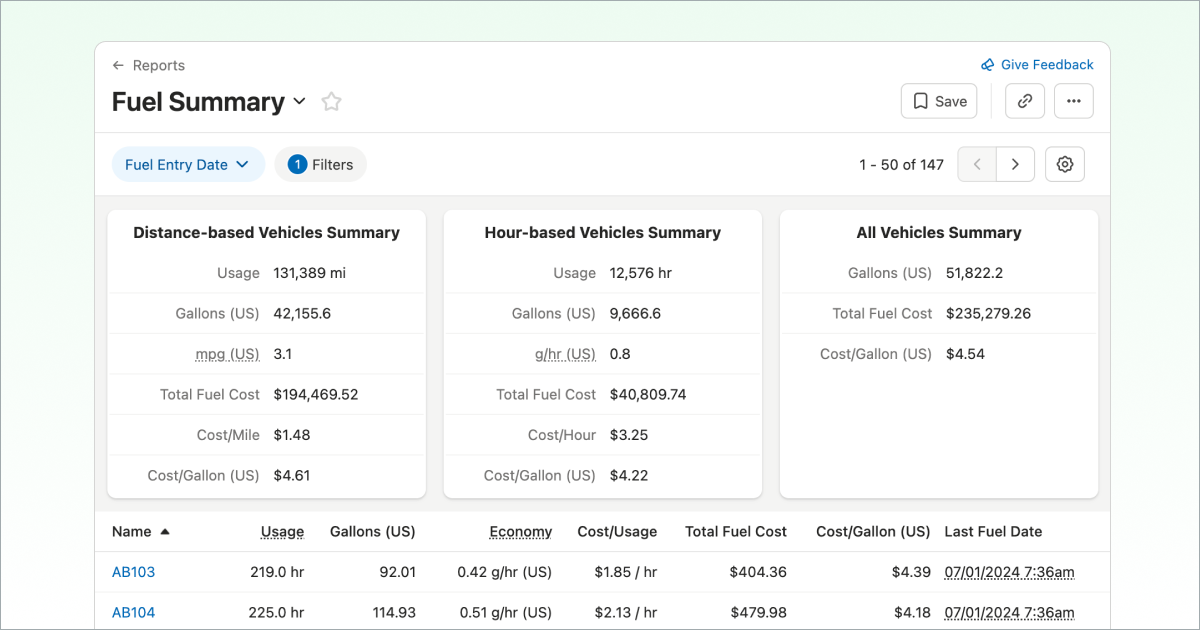Improving Costs and Efficiency with a Fuel Management System
Fuel management systems provide numerous benefits to fleets, including reducing fuel spend, waste, misuse and theft. This comprehensive guide to fuel management systems delves into how these systems work, and how fleets can use them to improve their operational fuel efficiency.
Feb 11, 2025
9 min read

Jump to a topic
Benefits of Fuel Management Systems
How do Fuel Management Systems Work?
Improve Fuel Management with FMS
What is a Fuel Management System?
Because fuel is such a large portion of a fleet’s expenses, staying apprised of when and how fuel is used is crucial. Not only will this help you better control fuel spend, it’ll allow you to better understand the health of your fleet assets. Fleet fuel management systems enable managers and stakeholders to track and monitor fuel-related data in real time, including fuel consumption, transactions and issues related to maintenance and driver behavior.
Fuel management systems take the guesswork (and legwork) out of manually tracking data via automated data collection, which improves data accuracy and reduces time to insight. Additionally, when using a fuel management system, managers are automatically notified of exceptions, such as over-fueling, fueling at unapproved vendors and fueling outside geofencing parameters. This allows fleets to improve fuel theft monitoring in real time so the issue can be quickly addressed.
Fleets can also use fuel management systems to identify routing inefficiencies. Knowing the best routes for your drivers plays a key role in reducing fuel use, and route optimization helps you reduce fleet fuel costs. You can compare fuel spend per route to determine which routes are costliest to make informed adjustments.

Tracking true versus operational idle time is another benefit afforded by fuel management systems. Tracking true idle time can not only help you decrease it, thus decreasing unnecessary fuel use, it can also tell you when and where drivers are spending the most time along their routes, allowing you to catch potential issues. Tracking operational idle time, on the other hand, provides a better understanding of active time spent on jobsites, as well as fuel expenses for job types, so you can better discern discrepancies.
When integrating fuel management systems, like fleet management software (FMS) and telematics, fleets can get in-depth insights into mechanical issues causing reduced fuel economy through diagnostic trouble codes (DTCs). Whether it’s a faulty O2 sensor, worn timing components or just a loose fuel cap, monitoring DTCs related to fuel economy can help you determine and correct asset issues early to keep fuel costs low.
Ready to get control of your fleet’s fuel expenses?
Benefits of Fuel Management Systems
A fuel management system should act as a useful tool in a fleet’s operation. Like any other tool, it should provide some benefit to the user. While we briefly covered a few benefits of fuel management systems in the previous section, here we’ll break the top benefits down into a bit more detail, including how to implement positive, data-driven changes.
1. Improve Fuel Economy
The fuel economy of your fleet will likely be varied depending on asset age and type, so when evaluating fuel economy, it’s good practice to establish an asset’s baseline for comparison. This makes it easier to hone in on which assets are underperforming in fuel economy so you can pin down the cause. Using the data collected by fuel management systems, you can quickly track odometer readings and the number of gallons or liters purchased to monitor an asset’s fuel consumption over time. By comparing the asset’s baseline fuel economy against its consumption, you can determine how closely it’s performing to expectations. If the vehicle’s fuel economy drops below baseline, you can use historical fuel-related data in fuel management systems to determine the cause and take action to improve the asset’s fuel economy.
2. Streamline Fuel Tax Reporting
Quarterly IFTA reporting can be a strenuous process that strains fleet operations, making streamlined fuel tax reporting a major benefit of fuel management systems. Fuel management systems automatically aggregate fuel data and automate reports for quick access to more accurate data. Fuel entry data can be filtered by location (state/region/province) and fuel type, and reports can cover a custom range of dates. This type of report serves as a kind of IFTA assistant, streamlining the IFTA reporting process. Because reports in fuel management systems are configurable, you’ll always have the information you need for fuel tax reporting right at your fingertips.
3. Promote Good Driving Habits
Due to the scale at which fuel management systems are able to collect and disseminate data, fleets can more easily pinpoint causes of increased fuel consumption, such as driver behavior. In addition to causing mechanical issues and being a safety concern, such behaviors as speeding and harsh acceleration can play a major role in tanking fuel economy. Tracking driver behavior in fuel management systems via telematics or GPS integrations provides fleet managers with real-time alerts around dangerous driving, including the “who, what and where” of the incident.
4. Prevent Fuel Theft
Fuel management systems help fleets stay informed of fuel theft and misuse in real time with fuel capacity and location alerts. By monitoring fuel capacity, fuel management systems alert managers when the volume of fuel purchased is greater than the listed fuel capacity of the asset. When integrated with GPS solutions, fuel management systems alert fleet managers when a vehicle’s GPS location is different than where it was fueled, helping you catch problematic activity as it’s happening.
Fuel savings, not spending
Fleet cards, route planning and idle management. Learn it all here to help you save time and start slashing fuel costs.
Better fuel management awaitsHow do Fuel Management Systems Work?
Fuel management systems can work in several ways depending on the fleet solution in use, such as fuel cards, on-site fuel systems, on-site fueling, or telematics or fleet management software (FMS). Fuel cards and on-site fuel systems collect transactional fuel data, including driver ID and odometer reading — which are typically keyed in at the pump — number of gallons or liters pumped, cost per unit, fuel grade, location and time of fueling. Telematics solutions, however, use an on-board plug-in device to collect data directly from an asset and provide detailed fuel-related information, including driver behavior, DTCs and idle time. And because telematics has built-in GPS, you can also track fueling location.
Some fleets opt to use on-site fueling for security, convenience and cost savings. A robust on-site fueling system typically integrates hardware, a mobile app and/or a web portal for improved fuel data accessibility and management. On-site fuel providers offer access to all kinds of fuel data, including real-time tank level visibility, as well as management features like comprehensive pump and driver controls, real-time transaction tracking and advanced reporting tools.
Learn more about Fleetio’s on-site fueling partners
When using a fuel management system in FMS, you can import historic fuel data from spreadsheets or legacy software and easily track fuel economy in addition to keying in transactional information using a mobile app, allowing fleets to monitor per-mile operating costs of fleet assets. Integrating fuel cards, on-site fueling systems and/or telematics with FMS provides more accurate, timely data accumulation and allows you to see into your fleet’s fuel usage more thoroughly. This way, you can better monitor fuel spend as it relates to daily operations, including fuel used while on jobsites to determine true cost of projects, fuel spend by operator to determine asset or fuel card misuse and fuel spend by asset to determine potential mechanical issues and replacement cycles.
Fuel Data Collection
Fuel management systems provide a more automated way of collecting data and increase data accuracy for more actionable, in-depth insights. Collected data is then categorized and sorted on the back end for easy report generation that can be sorted by criteria of your choosing, including by asset, depot (for fleets with multiple locations), date, etc. Automated fuel data collection reduces instances of error associated with manual collection and documentation, improving data reliability, and cuts the time it would take to manually retrieve, sort and analyze fuel data to almost nil.
Fuel Transactions
Having to reconcile fuel receipts can be tedious and time-consuming. If drivers are late getting receipts in or if they lose one, it’s less likely that your fuel data will reflect actual fuel use and spend. Fuel management systems not only capture that data automatically, they also allow drivers to take pictures of and submit receipts via a mobile app should the business need that documentation separately.
Proven fuel savings, fleet-wide
Thousands of fleet managers trust Fleetio to help cut fuel waste, improve efficiencies and boost accountability. You can too!
See how we can helpException Reports
Fuel management systems provide exception reports around over-capacity and missing GPS location transactions. The reports allow fleets to pin down the culprit of exceptions and surface repeat offenders so the issue can be addressed quickly. When assessing discrepancies in fuel spend and consumption, you can compare overall fuel data with that from exception reports to corroborate whether exceptions are the cause of inflated numbers versus mechanical or driver behavior issues.
Improve Fuel Management with Fleet Management Software
While fuel cards and on-site fueling platforms can be considered fuel management systems, even the best fleet fuel cards don’t generate a complete picture of an operation’s fuel activities and expenses. Integrating existing fuel tracking systems with fleet management software (FMS) or telematics can help provide robust insights into fleet fueling. Integrating either fuel cards or telematics (or both) with FMS allows for far more comprehensive insights into fuel data and how that data interacts with other fleet data for improved operational management and cost analysis.

Fleetio automatically tracks data related to every aspect of fleet, including maintenance and repairs, inspections, issues, usage, productivity, downtime and fuel activity, plus expenses related to each. By collecting, consolidating and aggregating this data for you in real time, Fleetio is able to provide at-a-glance insights for quick analysis so you can hone in on fuel issues on a more granular level. Fleets can use Fleetio to surface increases in fuel costs related to mechanical issues and theft/misuse by comparing fuel reports to service histories, inspection histories, preventive maintenance (PM) compliance rates and exception reports to find the true total cost of fuel use per asset, helping to determine whether an increase in fuel spend is due to the asset itself, poor maintenance practices or driver activities.
While Fleetio helps fleets monitor and control fuel expenses, it also uses complete fleet data to calculate total cost of ownership (TCO) for fleet assets so managers and stakeholders can better determine acquisition and replacement cycles and gain a clearer understanding of overall fleet health and productivity. Fleets can use fuel management workflows in Fleetio to gain a more accurate analysis of fuel expenses in relation to job types, assets and within the fleet as a whole to help improve fuel management and increase the fleet’s bottom line.
Can your spreadsheets do this?
Visibility is the first step to savings. With Fleetio, you can monitor utilization, fuel economy and spend all in one place — at a glance.
Let's talk
Senior Fleet Content Specialist
As a Senior Fleet Content Specialist at Fleetio, Rachael Plant uses her near decade of industry experience to craft practical content aimed at helping fleet professionals tackle everyday challenges with confidence.
LinkedIn|View articles by Rachael PlantReady to get started?
Join thousands of satisfied customers using Fleetio
Questions? Call us at 1-800-975-5304


